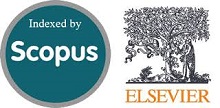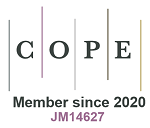Hybrid Controller based on Null Space and Consensus Algorithms for Mobile Robot Formation
Abstract
Doi: 10.28991/ESJ-2022-06-03-01
Full Text: PDF
Keywords
References
Tanner, H. G., Pappas, G. J., & Kumar, V. (2004). Leader-to-formation stability. IEEE Transactions on robotics and automation, 20(3), 443-455. doi: 10.1109/TRA.2004.825275.
Oh, K. K., Park, M. C., & Ahn, H. S. (2015). A survey of multi-agent formation control. Automatica, 53, 424–440. doi:10.1016/j.automatica.2014.10.022.
Claret, J.-A. (2019). The Robot Null Space: New Uses for New Robotic Systems. PhD Dissertation, Technical university of Catalonia Barcelona tech, Barcelona, Spain.
Martinez, J. B., Becerra, H. M., & Gomez-Gutierrez, D. (2021). Formation tracking control and obstacle avoidance of unicycle-type robots guaranteeing continuous velocities. Sensors, 21(13), 4374. doi:10.3390/s21134374.
Rashid, M. Z. A., Yakub, F., Zaki, S. A., Ali, M. S. M., Mamat, N. M., Mohd Putra, S. M. S., Roslan, S. A., Shah, H. N. M., & Aras, M. S. M. (2019). Comprehensive review on controller for leader-follower robotic system. Indian Journal of Geo-Marine Sciences, 48(7), 985–1007.
Saradagi, A., Muralidharan, V., Krishnan, V., Menta, S., & Mahindrakar, A. D. (2018). Formation Control and Trajectory Tracking of Nonholonomic Mobile Robots. IEEE Transactions on Control Systems Technology, 26(6), 2250–2258. doi:10.1109/TCST.2017.2749563.
Antonelli, G., Arrichiello, F., & Chiaverini, S. (2008). The null-space-based behavioral control for autonomous robotic systems. Intelligent Service Robotics, 1(1), 27–39. doi:10.1007/s11370-007-0002-3.
Antonelli, G., Arrichiello, F., & Chiaverini, S. (2009). Experiments of formation control with multirobot systems using the null-space-based behavioral control. IEEE Transactions on Control Systems Technology, 17(5), 1173–1182. doi:10.1109/TCST.2008.2004447.
Rosales, C., Leica, P., Sarcinelli-Filho, M., Scaglia, G., & Carelli, R. (2016). 3D Formation Control of Autonomous Vehicles Based on Null-Space. Journal of Intelligent and Robotic Systems: Theory and Applications, 84(1–4), 453–467. doi:10.1007/s10846-015-0329-5.
Trujillo, M. A., Becerra, H. M., Gómez-Gutiérrez, D., Ruiz-León, J., & Ramírez-Treviño, A. (2018). Priority Task-Based Formation Control and Obstacle Avoidance of Holonomic Agents with Continuous Control Inputs. IFAC-PapersOnLine, 51(13), 216–222. doi:10.1016/j.ifacol.2018.07.281.
Leica, P., Herrera, M., Rosales, C., Roberti, F., Toibero, J., & Carelli, R. (2018). Dynamic obstacle avoidance based on time-variation of a potential field for robots formation. IEEE 2nd Ecuador Technical Chapters Meeting, ETCM 2017, Salinas, Ecuador, 1–6. doi:10.1109/ETCM.2017.8247493.
Arevalo, B., Cruz, P. J., & Leica, P. (2018). Sliding mode formation control of mobile robots with input delays. IEEE 2nd Ecuador Technical Chapters Meeting, ETCM 2017, Salinas, Ecuador, 1–6. doi:10.1109/ETCM.2017.8247448.
Fan, J., Liao, Y., Li, Y., Jiang, Q., Wang, L., & Jiang, W. (2019). Formation Control of Multiple Unmanned Surface Vehicles Using the Adaptive Null-Space-Based Behavioral Method. IEEE Access, 7, 87647–87657. doi:10.1109/ACCESS.2019.2925466.
Camacho, O., Leica, P., Antamba, J., & Quinonez, J. (2019). Null-Space Based Control Applied to a Formation of Aerial Manipulators in Congested Environment. Proceedings - 2019 International Conference on Information Systems and Computer Science, INCISCOS 2019, Quito, Ecuador, 244–250. doi:10.1109/INCISCOS49368.2019.00046.
Moreira, M. S. M., Brandao, A. S., & Sarcinelli-Filho, M. (2019). Null space based formation control for a UAV landing on a UGV. 2019 International Conference on Unmanned Aircraft Systems, ICUAS 2019, Atlanta, United States, 1389–1397. doi:10.1109/ICUAS.2019.8797820.
Samaniego, P., Vaca, E., Leica, P., Chavez, D., & Camacho, O. (2018). Dynamic obstacle avoidance based on null-space for quadcopter’s formation. IEEE 2nd Ecuador Technical Chapters Meeting, ETCM 2017, Salinas, Ecuador, 1–6. doi:10.1109/ETCM.2017.8247532.
Vaca, E., Samaniego, P., Cruz, P. J., & Leica, P. (2019). Null-Space based Robust Controller for Quadcopter’s formation in windy environments. Proceedings - 3rd IEEE International Conference on Robotic Computing, IRC 2019, Naples, Italy, 643–649. doi:10.1109/IRC.2019.00131.
Bacheti, V. P., Brandão, A. S., & Sarcinelli-Filho, M. (2021). Path-following by a UGV-UAV formation based on null space. 2021 14th IEEE International Conference on Industry Applications, INDUSCON 2021 - Proceedings, Sao Paulo, Brazil, 1266–1273. doi:10.1109/INDUSCON51756.2021.9529472.
Neto, V. E., Sarcinelli-Filho, M., & Brandao, A. S. (2019). Trajectory-tracking of a heterogeneous formation using null space-based control. 2019 International Conference on Unmanned Aircraft Systems, ICUAS 2019, Atlanta, United States, 187–195. doi:10.1109/ICUAS.2019.8798031.
Huang, Y. C., Shen, J. T., Chiang, M. L., Chen, Y. W., Chua, T. L., & Fu, L. C. (2019). Dual Null-Space Based Controller Design with Signal Compensation for Formation with Conflicted Tasks. CCTA 2019 - 3rd IEEE Conference on Control Technology and Applications, City University of Hong Kong, Hong Kong, China, 958–963. doi:10.1109/CCTA.2019.8920433.
Zhou, N., Cheng, X., Xia, Y., & Liu, Y. (2020). Distributed Formation Control of Multi-Robot Systems: A Fixed-Time Behavioral Approach. 59th IEEE Conference on Decision and Control, CDC 2020, Jeju Island, South Korea, 4017–4022. doi:10.1109/CDC42340.2020.9304057.
Olfati-Saber, R., Fax, J. A., & Murray, R. M. (2007). Consensus and cooperation in networked multi-agent systems. Proceedings of the IEEE, 95(1), 215–233. doi:10.1109/JPROC.2006.887293.
Ren, W., & Beard, R. W. (2008). Distributed consensus in multi-vehicle cooperative control: Theory and applications. Communications and Control Engineering, London, United Kingdom. doi: 10.1007/978-1-84800-015-5.
Ren, W., & Cao, Y. (2011). Distributed coordination of multi-agent networks: Emergent problems, models, and issues. In Communications and Control Engineering, Springer, London, United Kingdom. doi:10.1007/978-0-85729-169-1.
Zhang, H., Zhao, Z., Meng, Z., & Lin, Z. (2014). Experimental verification of a multi-robot distributed control algorithm with containment and group dispersion behaviors: The case of dynamic leaders. IEEE/CAA Journal of Automatica Sinica, 1(1), 54–60. doi:10.1109/JAS.2014.7004620.
Cao, Y., Stuart, D., Ren, W., & Meng, Z. (2010). Distributed containment control for double-integrator dynamics: Algorithms and experiments. Proceedings of the 2010 American Control Conference, Baltimore, United States, 3830-3835.
Cao, Y., Ren, W., & Egerstedt, M. (2012). Distributed containment control with multiple stationary or dynamic leaders in fixed and switching directed networks. Automatica, 48(8), 1586–1597. doi:10.1016/j.automatica.2012.05.071.
Vizuete, R., Abad Torres, J., Leica, P. (2020). Application of a Distributed Containment Algorithm: Trajectory Tracking for Mobile Robots. In: Gusikhin, O., Madani, K. (eds) Informatics in Control, Automation and Robotics. ICINCO 2017. Lecture Notes in Electrical Engineering, vol 495. Springer, Cham, Switzerland. doi: 10.1007/978-3-030-11292-9_11.
Peng, H., Wang, J., Wang, S., Shen, W., Shi, D., & Liu, D. (2020). Coordinated Motion Control for a Wheel-Leg Robot with Speed Consensus Strategy. IEEE/ASME Transactions on Mechatronics, 25(3), 1366–1376. doi:10.1109/TMECH.2020.2975083.
Koung, D., Fantoni, I., Kermorgant, O., & Belouaer, L. (2020). Consensus-based formation control and obstacle avoidance for nonholonomic multi-robot system. 16th IEEE International Conference on Control, Automation, Robotics and Vision, ICARCV 2020, Shenzhen, China, 92–97. doi:10.1109/ICARCV50220.2020.9305426.
Wang, N., Dai, J., & Ying, J. (2021). Research on Consensus of UAV Formation Trajectory Planning Based on Improved Potential Field. 40th Chinese Control Conference, CCC, Shanghai, China, 99–104. doi:10.23919/CCC52363.2021.9550138.
Xu, Y., Yao, F., & Chai, S. (2020). Distributed Formation Control for Multiple Quadrotor System Based on Consensus Algorithm. 39th Chinese Control Conference, CCC, 2020-July, Shenyang, China, 4872–4877. doi:10.23919/CCC50068.2020.9189136.
Wu, F., He, J., Zhou, G., Li, H., & Liu, Y. (2021). Performance of Sliding Mode and Consensus-based Control Approaches for Quadrotor Leader-Follower Formation Flight. 2021 International Conference on Unmanned Aircraft Systems, ICUAS 2021, Athens, Greece, 1671–1676. doi:10.1109/ICUAS51884.2021.9476782.
Kada, B., Khalid, M., & Shaikh, M. S. (2020). Distributed cooperative control of autonomous multi-Agent UAV systems using smooth control. Journal of Systems Engineering and Electronics, 31(6), 1297–1307. doi:10.23919/JSEE.2020.000100.
DOI: 10.28991/ESJ-2022-06-03-01
Refbacks
- There are currently no refbacks.
Copyright (c) 2022 Oscar Camacho







